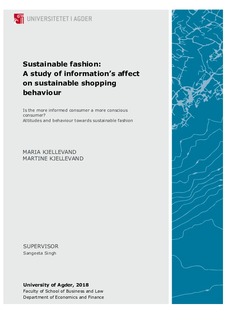| dc.contributor.author | Kjellevand, Maria | |
| dc.contributor.author | Kjellevand, Martine | |
| dc.date.accessioned | 2018-09-11T11:16:15Z | |
| dc.date.available | 2018-09-11T11:16:15Z | |
| dc.date.issued | 2018 | |
| dc.identifier.uri | http://hdl.handle.net/11250/2562005 | |
| dc.description | Master's thesis Business Administration BE501 - University of Agder 2018 | nb_NO |
| dc.description.abstract | The fashion industry today is one of the most polluting industries in the world. The industry is
pouring out new trends and cheap quality, creating a never-ending hunger for newness.
Many consumers wish to behave green, but they are struggling to put their intentions in to
actions, there is an attitude-action gap. In a world with cheap and trendy apparel, it is hard to
choose the more expensive and sustainable choice. Self-efficacy is believing in one owns
abilities and when a consumer does not believe that their purchasing behaviour makes an
impact, it is difficult to change it. Thaler believes consumers can be nudged to change
behaviour, can information nudge consumers to chose sustainably?
In this research a survey was created to test if information could increase self-efficacy and
result in higher likeliness to buy green. The survey entailed an experiment and was distributed
in two groups, one receiving more information than the other. The participants were shown a
sustainable t-shirt, where the group with information received explanation of the sustainability
of the t-shirt. This way, it was possible to test the effects of information. Analysing the results
within the groups and between the groups, the information did not increase likeliness to buy
sustainable products in general, but it was evident that information resulted in higher
likeliness to buy the sustainable, simulated t-shirt. The self-efficacy scale was included to
further research the link between self-efficacy and the attitude-action gap. The scale did not
result in a clear connection to sustainable behaviour, though agreement to statement of
believing in own abilities gave a higher likeliness to act sustainably.
The conclusion of this study is that information can nudge consumers’ likeliness to buy
sustainable. | nb_NO |
| dc.language.iso | eng | nb_NO |
| dc.publisher | Universitetet i Agder ; University of Agder | nb_NO |
| dc.rights | Attribution-NonCommercial-NoDerivatives 4.0 Internasjonal | * |
| dc.rights.uri | http://creativecommons.org/licenses/by-nc-nd/4.0/deed.no | * |
| dc.subject | BE501 | nb_NO |
| dc.title | Sustainable fashion : A study of information’s affect on sustainable shopping behaviour Is the more informed consumer a more conscious consumer? Attitudes and behaviour towards sustainable fashion | nb_NO |
| dc.type | Master thesis | nb_NO |
| dc.subject.nsi | VDP::Samfunnsvitenskap: 200::Økonomi: 210 | nb_NO |
| dc.source.pagenumber | 94 p. | nb_NO |

